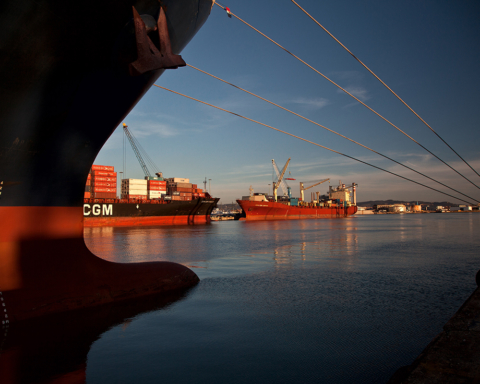With the International Court ruling, which gives Italy the power to judge the case, finally comes a decisive turning point in the legal issue concerning the Italian marines Massimiliano Latorre and Salvatore Girone, who were involved in the incident of 15th February 2012 in which two fishermen died. Their trial will therefore be held in Italy.
The first to rejoice about this result was Ambassador Giulio Terzi di Sant’Agata, former Foreign Minister in the Monti government. “This decision” – he explained to PortNews – “shows how the path of compulsory arbitration, which I pursued right from the beginning, was the only one that was really feasible. The only win-win strategy for both parties, Italy and India.”
Justice has finally run its course but for the high-ranking diplomat too much time has been lost: “After the Monti government, even the governments led first by Mr. Letta and then by Mr. Renzi unfortunately attempted impractical alternative solutions and only because they feared reactions from India.” What matters, however, is that in the end “what we had been saying from the outset has been recognized, namely that the Italian soldiers were on a mission to combat piracy and that, according to the rules of international law and conventions, they could only be subject to Italian jurisdiction.”
It now remains to be clarified whether it is right to establish Italy’s responsibility to compensate India for the loss of human lives, right from now: “This is a decision that I do not agree with, since it remains to be seen whether the marines fired or whether the accident took place in a totally different area and with a completely different ship,” objected Mr. Terzi.
There are still a lot of questions to be answered. The ambassador does not believe that anything went wrong in the rules of engagement: “The use of military forces on board merchant ships was abandoned by our government immediately after the Enrica Lexie incident. Since then, the fight against piracy has been conducted directly by military units. I believe, however, that the rules of engagement had been well established and had no obvious flaws.”
For Mr. Terzi the biggest mistake was made in the phase immediately after the incident: “The Indian coast guard contacted the Enrica Lexie by radio asking if she had been involved in a pirate attack and, after receiving confirmation from the Italian tanker, asked her to berth in the port of Kochi. The decision to leave international waters to reach the nearest coastal port, thus handing themselves over to the local jurisdiction, was a grave one. As soon as I was informed about it, I immediately communicated my clear opposition to the Defense Ministry, but I was told that the vessel was now in Indian waters. This episode was a very serious one, since the military chain of command should in no way have disregarded the opinion of the Minister of Foreign Affairs, let alone the Prime Minister’s.”
The responsibility for what happened was therefore not the shipowner’s but the Interforce Operational Summit Command’s, responsible for the management of complex crises. “Nothing can take my mind off the fact that the authorization to sail into territorial waters was given by the highest political levels” says Mr Terzi angrily. “The Minister of Defense Giampaolo Di Paola couldn’t not know, nothing escaped him. If we had not set course towards Kochi we wouldn’t still be in this situation eight years later.”
“Those days were tense and hectic,” he recalls. “At first, the whole government approved the decision not to send the marines back to India, but then Indian pressure pushed the government to overturn its decisions”. Hence Mr. Terzi’s sensational decision to resign immediately from the Italian Foreign Ministry, in open disagreement with what had happened: “Let’s not forget that Latorre and Girone were accused of terrorism and that the penalty in India for this type of crime is death. In spite of this, the Government agreed to send our two soldiers back to them without any substantial reassurance that the death penalty would not be applied. In short, my decision was dictated by common sense.”
Common sense also prevailed in the Hague judgment. “International law has been reaffirmed in its strategic role, at a time when elsewhere it is ignored if not trampled on”, observed Terzi, mentioning the dispute over the South China Sea, where Beijing claims its right to 90% of it. “By accepting the Philippine Government’s appeal, the International Court has already stated that there is no legal basis for China to claim rights and resources on waters outside those defined by the UN Convention. Beijing has, however, discarded international law, declaring the Hague decision null and void.”
In the Chinese refusal Mr. Terzi sees the domineering resolve of a country that operates in contempt of any international agreement: “China” – he says – “represents a threat to world peace and security. Beijing does not only want to impose the word CCP within the country. Xi wants to impose it on the world, starting with Europe.”
The former Foreign Minister says he is concerned about China’s growing expansionism and the “dual use” strategy with which it aims to openly merge two dimensions, civilian and military: “History is full of examples of civilian ships and maritime infrastructure used for strategic purposes. China is already doing so in the South China Sea. And thanks to Italy it is now replicating the same pattern in the Tyrrhenian and Adriatic seas.”
Mr. Terzi denounces the growing misalignment of Rome from the European ranks: “The signing of the Memorandum of Understanding with President Xi Jinping was a mistake. China is pursuing its strategy of commercial and military penetration through the Belt and Road Initiative and in our country is finding fertile ground for its conquests”.
The Chinese conditioning on Italy “also concerns the first port infrastructures started for the Silk Road to Europe, in Trieste and Vado Ligure, and now also regards the Taranto area”. According to the former minister, China is now completing what it had failed to do in the 15th century, when it sailed with over 200 ships to countries overlooking the Indian Ocean, the Mediterranean and the Persian Gulf.
“It wouldn’t have taken much for the Chinese to colonize our continent too, changing the course of history. They didn’t, but there’s nothing to prevent that from happening again. The EU member countries must move together and take a clear position. That is why the outcome of the marines affair is important: it shows that there is an international legal order that must be supported with great conviction in all multilateral forums, or there will be another disaster soon.”
Translation by Giles Foster




